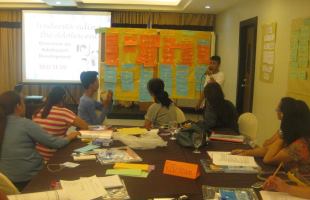
The Department of Health Regional Office XII, with support from the World Health Organization Country Office in the Philippines through the Joint Program on Maternal and Newborn Health (JPMNH) recently conducted the Training of Trainers (TOT) on Noncommunicable Disease (NCD) Orientation for Adolescents. The training aimed to build the capacity of youth leaders and program implementers to facilitate training and education sessions on preventing noncommunicable diseases and promoting healthy lifestyle among adolescents. Participants to the training included a mix of selected youth leaders in Region XII and program implementers in Regions XI and XII.
During the training, the participants were provided with the basic information on the four major noncommunicable diseases, i.e. cardiovascular diseases, diabetes mellitus, chronic respiratory diseases and cancers; how to practice and encourage others to practice healthy lifestyle addressing the NCD risk factors such as unhealthy diet, physical inactivity, smoking, harmful use of alcohol, and overweight/obesity; and how to facilitate trainings and education sessions with adolescents by applying the principle of learning by doing. The training ended with a pledge of commitment for healthy lifestyle from the participants.
“Prevention of noncommunicable diseases and promoting healthy lifestyle must be everyone’s priority. This should begin as early as during childhood and adolescence, a period that lays the foundation for risk factors such as unhealthy diet, physical inactivity, smoking, and harmful use of alcohol,” according to Dr Gundo Weiler, WHO Representative in the Philippines. “It is better to start healthy behaviors early in life than reacting when NCDs manifest later in life. Prevention is better than cure.”
Recent researches and surveys conducted by various research institutions and government agencies such as the 2013 Young Adults Fertility and Sexuality Study (YAFS 4), the 2015 Global School-based Student Health Survey (GSHS) and the 8th National Nutrition Survey (NNS) revealed that the adolescents and young people are exposed to NCD risk factors. Results of these surveys were also discussed during the training and the training participants were asked to share possible ways on how to address these NCD risk factors.
